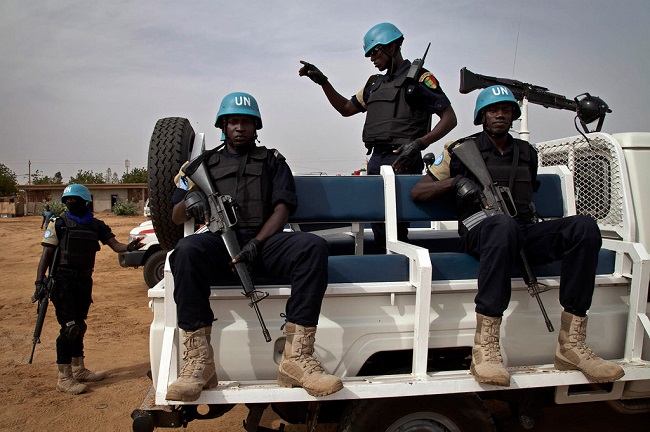Making UN peacekeeping more effective
The UN’s peacekeeping operations are facing many challenges. Demand for UN missions is increasing. At the same time, the resources available are limited and must be managed prudently.
The nature of international conflict has changed over the past 25 years. Interstate armed conflicts have been largely replaced by intrastate conflicts, often in countries with weak government institutions and impaired capacity to protect their own populations. Today, 1.5 billion people live in fragile and conflict-affected countries or countries in which criminal violence is rife.
This places new demands on international crisis management and peacekeeping operations. What were largely military commitments in the past have become more complex, multidimensional UN missions involving military personnel, police and civilian functions acting side by side.
The UN, the EU and other regional actors must strengthen and adapt their peacekeeping instruments and capacities in order to handle current challenges. Following its failures in Rwanda and the Balkans in the mid-1990s, the UN implemented a comprehensive review of its peacekeeping operations. This resulted in a number of reforms, including the integration of civilian and military components in UN peace operations. Around the same time, the EU began developing its crisis management capacity which from the outset, at the initiative of Sweden and others, focused on civilian tools.
The UN has a central role to play in international crisis management, thanks to its legitimacy and widespread presence in the field. However, the global organisation has limited resources at its disposal and a constant stream of new challenges to handle. It just doesn’t add up.
The UN’s peacekeeping operations are at a crossroads once again. In today’s conflicts, it’s more a matter of protecting civilians than monitoring ceasefires. New threats such as organised crime and terrorism also affect peacekeeping operations. The UN must sharpen its instruments once again. The UN Secretary-General therefore decided last year on a new review of UN peace operations. A high-level panel of experts has been appointed and is expected to submit a report later this spring.
Since 1996, Sweden has participated in the Challenges Forum, a unique international network of partner organisations. The Forum, which has representatives from six continents and 21 countries, helps to identify ways to meet the challenges facing international peace operations. The Folke Bernadotte Academy hosts the Challenges Forum International Secretariat.
In its latest report, the Challenges Forum presented 24 targeted recommendations on how to further develop UN peace operations. On behalf of all the partner organisations, we will today (27 January) hand over the report to UN Secretary-General Ban Ki-moon at the UN Headquarters in New York. This handover takes place at a strategic time, as the report will be able to contribute to the UN’s own review of its peacekeeping operations.
The report’s recommendations include the following:
– That the UN must strengthen its capacity to identify and develop strategies to meet new transnational threats, such as terrorism and organised crime.
– That UN peace operations should use new technology to strengthen its capacity to obtain intelligence, and that Member States should make the necessary resources available to the UN to make this possible.
– That cooperation between the UN and regional organisations engaged in peace operations must be strengthened and streamlined.
– That integrated guidelines for implementing strategies in peace operations should be drafted, on gender equality issues for example.
Sweden wants to contribute actively to the UN’s capacity to handle international conflicts in various ways. Therefore, Sweden is now strengthening its commitment to the UN within the areas of peace and security, sustainability, equality and gender equality. We are doing this by pursuing important normative issues and by making concrete contributions to UN operations.
We are doing this by providing Swedish troops, police officers and civilian personnel to international peace operations. The most recent example is Sweden’s current stationing of military personnel to the United Nations Multidimensional Integrated Stabilisation Mission in Mali (MINUSMA).
We are doing this by pursuing the issue of ending sexual violence in conflict. This has been going on for centuries, but until now the issue and its victims have been silenced. It is only now, with the systematic collection of information and data on sexual violence, that we have understood the enormous breadth of these crimes – that principally target women and girls.
We are doing this by actively working to strengthen women’s active engagement and participation in issues concerning peace and security. Sustainable peace can only be achieved if all competence is utilised. Women must be involved, both around the negotiating table and in the reconstruction of the country when the conflict has ended.
Sweden’s various contributions to the UN’s peacekeeping operations and its candidacy for the Security Council 2017-2018 are central expressions of the country’s strengthened commitment to the UN. Sweden wants to take responsibility and actively participate in ensuring that the UN is better equipped to handle today’s global challenges.


